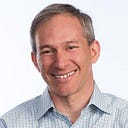Think Week, inspired by Bill Gates
I have long admired Bill Gates for many reasons. One of his habits that I have tried to emulate is his tradition of having an annual “Think Week”, where he largely unplugs and dedicates himself to reading books and having the intellectual space to think deeply about issues.
I modify my annual Think Week in that I do it while with my family over the Christmas holidays. We all enjoy each other’s company so much and mutually appreciate the space to read and reflect at a time when email traffic is usually at a minimum and I can afford to exercise my long twitch, intellectual muscles rather than my short twitch ones that are more typically at work during the usual weekly routine.
This year, my reading was focused on a few central themes. The global rise of populism due to widening economic inequality was one, pointing to the fact that the Western Hemisphere has been operating in the context of two systems that have proven to be deeply flawed: democracy and capitalism. To paraphrase Churchill, they’re both terrible, imperfect systems but the least bad ones we have.
One of the books I read along this theme was Winners Take All: The Elite Charade of Changing the World by Anand Giridharadas. It is one of the more thought-provoking books I have read in a while, challenging many of my core assumptions about the value of applying business tools to social problems. I don’t agree with everything in the book, but it was one of those books that made me question my worldview of where the private sector can step in to fill the gaps that the public sector leaves behind as well as challenging my typical “win-win” thinking with the realization that some of the solutions to our problems may be “win-lose”. It made me realize that Business Leaders Getting Woke is a fraction of the solution — we also need to rethink whether capitalism is prima facie always the best approach to solving hard social problems and to be more alert to having real experts — not successful business people — at the table to address the hard issues in front of us.
Another book I enjoyed last week was Capitalism Without Capital: The Rise of the Intangible Economy by Jonathan Haskel and Stian Westlake. As a technology-focused venture capitalist, I live in the intangible economy. That said, this book made me think more broadly about the systematic implications of the radical economic shift that is happening from tangible-based to intangible-based value add. The chart below shows the data behind the dramatic shift, but the book does a great job of outlining the implications of those shifts, including accelerating inequality as intangible or knowledge-based goods and services are inherently going to have more attractive scale economies and rapid, global potential than physical-based. They also provide insight as to why the intangible economy inherently leads to a greater concentration of power amongst leaders and hence a less competitive economic system. Other provocative questions, which the book doesn’t fully address, are regarding the complex policy implications of a knowledge-based, intangible economy — both to support and nurture the continued growth of this paradigm but also to help those who are left out of reaping the vast and growing benefits of the current system.
Some thoughtful leaders have been discussing capitalism’s flaws and what adjustments can and should be made to our “shareholder value uber alles” philosophy, including:
- The Economist (their manifesto for renewing liberalism and assessment of a weakening competitive environment and what to do about it were excellent).
- Revered hedge fund manager Seth Klarman (read his recent speech at Harvard Business School on challenging capitalism’s core assumptions and practices).
- Blackrock’s chairman/CEO Larry Fink (his annual shareholder letter from last year deserves re-reading; I’m keen to see what he focuses on this year).
- Ford Foundation’s Darren Walker annual letter from a few years ago, Toward a New Gospel of Wealth, was especially thoughtful
It may sound funny for a venture capitalist and HBS professor to be questioning capitalism’s flaws, but I have come to the point of view that if those of us who love and appreciate our free market, democratic system don’t work hard on its renewal, more shrill voices will grab seats at the table and try to tear it down and indiscriminately throw out the good with the bad.
I hope your inbox paused a bit these last few days and that these deeper thoughts — and whatever ones you’re thinking about — can be incorporated in the hustle bustle that has already begun. Happy 2019!
